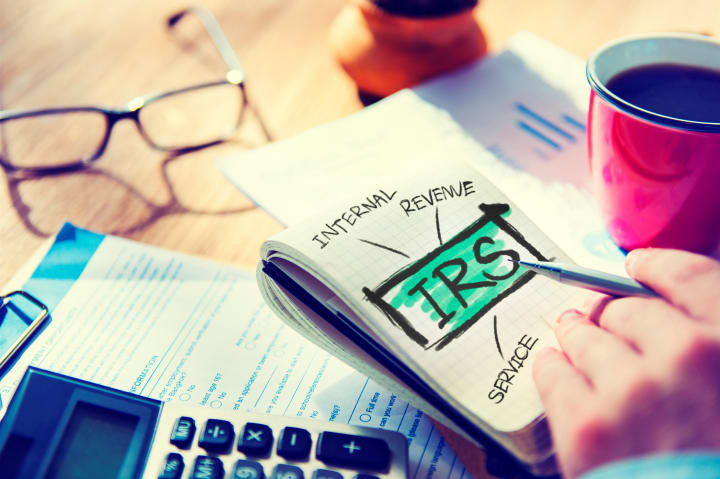The IRS Has a New $600 Rule for 2022 For All Gig Economy Workers
Don't worry - They won't be monitoring your bank account

First, here is not what is happening. The IRS is not going to monitor your account for your transactions. A number of reports emerged that the IRS was going to "monitor" all bank accounts over $600. A recent USA Today article correctly puts this report to bed. It's not going to happen.
The USA Today article was written to discuss the tax law proposal by the Biden administration to correct a false Instagram post saying it was going into effect.
The article shows that, although there had been a proposal to monitor bank accounts, this was not approved by Congress. Therefore, without Congressional approval, the bank monitoring (for accounts with $600 or more) is not going to happen. You can thank Senator Manchin for that.

The New IRS $600 Rule
However, there is a new $600 IRS Rule that was announced on Jan. 12 on the IRS website. The title of the press release is this: "Taxpayers must report gig economy earnings when filing taxes."
There is now a new reporting requirement (revised Jan. 2022) for the 1099-K, which relates to third-party payments. In the past, if you had sales of $20,000 or produced at least 200 transactions (e.g., for sales through Amazon, Shopify, Etsy, etc. or even YouTube videos, online writing, etc.) you would have received a 1099-K from the third-party.
Now the rule is that any amount over $600, as a threshold, automatically triggers a 1099-K reporting requirement by the third party to both you and the IRS.
Here is exactly what the IRS says in its new Gig Economy rule for the 1099-K:
" What’s New. Exceptions for reporting of third-party network transactions. The reporting requirement for these transactions has changed from totals exceeding $20,000 to exceeding $600, regardless of the total number of transactions."
As a direct result of this gig economy workers in 2022 will receive 1099-K forms from all kinds of third-party processors like PayPal, Stripe, Tipalti, UpWork, Rapyd, Uber, Lyft, etc.

The IRS is Getting Hip To Gig Economy Workers
The IRS is getting on top of the gig economy and how people are getting paid. They already have a form called the 1099-NEC (Non-Employee Compensation), which third-party providers are required to send out.
This 1099-NEC already has a $600 payment threshold requirement, so that if you receive $600 or more in payments you should receive this form from your third-party payment provider this year. By the way, both the 1099-MISC and the 1099-NEC forms have to be sent out to people by Jan. 31.
If you want to know more about the existing $600 1099-NEC and/or the new $600 threshold for 1099-K payments, I suggest you watch this YouTube video from Not Your Dad's CPA. This guy does a very good job of describing what's new with the reporting requirements with the IRS for gig-economy workers.
Gig economy workers should keep one thing in mind. Any amount of income, whether it is over $600 or not, still is income. All income is subject to taxation. So whether you get a 1099-K, or a 1099-NEC or 1099-MISC or not, if you made any income, even if it is not over $600 you still are subject to paying taxes on it.
One way that I keep track of this is through spreadsheets and monthly totals. That way when I do get a 1099-MISC or 1099-NEC (and now potentially a 1099-K next year), I can see if the totals reported to the IRS are the same as what I calculated from payments received.
This is Not Bank Monitoring
Keep in mind that this is a far cry from the Biden Administration proposals that wanted to monitor all bank accounts with $600 or more. That is not going to happen, at least if Congress doesn't allow it.
However, you can see that the IRS is still actively trying to keep track of $600 or higher payments through these 1099-K, 1099-NEC, and 1099-MISC reporting requirements.
Mark R. Hake, CFA
****************************
This is not financial advice and you should not rely on my analysis to buy or sell any stock, security, or crypto, as I am not undertaking to induce you to buy or sell securities.
I am relying on the “publisher’s exclusion” in the Investment Advisers Act of 1940 to provide this information without any personalized or individualized investment advice. You should meet with your financial advisor, CPA, or accountant to get accurate and reliable information relating to your specific situation, and not rely on anything that I have written in this article for your particular circumstance.
About the Creator
Mark R Hake
Mark Hake is a financial writer for InvestorPlace, and writes as well on Medium.com and Newsbreak.com. He is a Chartered Financial Analyst (CFA) and has been an owner of a hedge fund, money management firm, and an investment research firm.






Comments
There are no comments for this story
Be the first to respond and start the conversation.